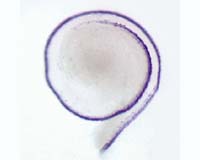 |
London (UPI) Oct 12, 2009 British scientists say they've identified a gene that has a significant effect on regulating hemoglobin in the body. The achievement came during a genome-wide association study conducted by Imperial College London researchers who looked at the link between genes and hemoglobin level in 16,000 people. It shows a strong association between a gene known as TMPRSS6 and the regulation of hemoglobin. "This new finding is critical (because) understanding how hemoglobin levels are controlled at a genetic level has significant public health implications for people of all ages in developing and developed countries," said John Chambers, one of the lead authors of the study. "Abnormally high or low levels are associated with a range of serious health problems, such as poor growth (low levels) and increased risk of stroke (high levels). Changes in hemoglobin levels can also affect our susceptibility to diseases like malaria, which infect the red blood cells" said Professor Jaspal Kooner, who led the investigation. The researchers said their findings add to science's understanding of the multiple causes of problems with hemoglobin levels and could lead to new treatments for people suffering from chronic hemoglobin problems. The research appears in the journal Nature Genetics. Share This Article With Planet Earth
Related Links Hospital and Medical News at InternDaily.com
 Cancer suppressing genes found
Cancer suppressing genes found Cold Spring Harbor, N.Y. (UPI) Oct 12, 2009 U.S. scientists say they have discovered a group of genes that act as barriers against cancer development. Cold Spring Harbor Laboratory researchers said they used a powerful technology called RNA interference, which suppresses gene activity, to screen hundreds of candidate tumor suppressors in living mice, using small hairpin-shaped molecules that attach to specific genes and switch ... read more |
|
| The content herein, unless otherwise known to be public domain, are Copyright 1995-2009 - SpaceDaily. AFP and UPI Wire Stories are copyright Agence France-Presse and United Press International. ESA Portal Reports are copyright European Space Agency. All NASA sourced material is public domain. Additional copyrights may apply in whole or part to other bona fide parties. Advertising does not imply endorsement,agreement or approval of any opinions, statements or information provided by SpaceDaily on any Web page published or hosted by SpaceDaily. Privacy Statement |